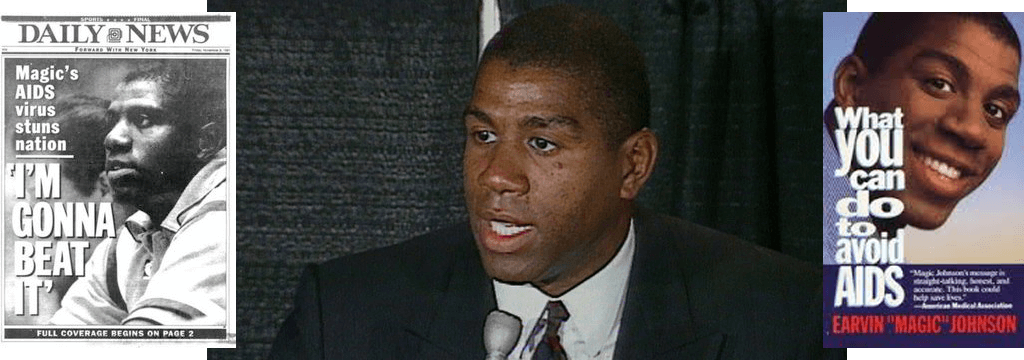One of the first things I saw on the morning news today was a look back on Nov. 7, 1991, the date that NBA superstar Earvin “Magic” Johnson announced during a nationally televised news conference that he had been diagnosed with HIV and was immediately retiring from professional basketball.
As I remember it, this news came completely out of left field. The media landscape in 1991 was incredibly different than it is today. Because there was no internet, social media or bloggers, the reporting was left to large national outlets and local beat writers. To my knowledge there were no leaks or rumors circulated to break the news in the days before it came out of Magic’s mouth. In a way I kind of wish things still worked like that.
I was a 14-year-old high school freshman, excited to embark upon his first “real” basketball season. That Thursday afternoon we gathered in the school gym, ready to participate in a three-on-three basketball tournament that served as both the season’s official kickoff as well as a chance for the various coaches to observe the players trying to earn a roster spot.
Prior to the tournament’s start, the varsity coach had everyone sit down on the gym floor around him. My initial thought was that he had some inspirational words to pass along before we got down to business. That was not the case.
I do not recall his exact words, but I do remember very clearly the stunned silence that fell over 100+ teenage boys when he told us what had occurred. It was like being told a family member had died suddenly and tragically.
This was one of our heroes, a man with all the charisma, talent and money in the world whom we had watched win five NBA championships in the previous decade-plus. His smile and easygoing personality made Magic one of the most recognizable celebrity faces in the world, and his superstardom on the court transcended into other parts of society.
Suddenly, these perceptions changed. This occurred back when not much was known and understood about AIDS and HIV, the virus which caused it. HIV was still viewed as a “gay disease” and I remember many of my friends immediately took the announcement to mean that Magic was a homosexual. As you can imagine, those views (and subsequent jokes) took on a life of their own.
A few years prior the nation had watched as Indiana teenager Ryan White became the face of HIV transmission via a blood transfusion, which opened some eyes to the fact that this is a sickness we all are in danger of contracting. But, there was still a lot of ignorance and fear surrounding those with the disease, and those with HIV/AIDS were still ostracized and discriminated against.
If it had not been for Magic’s announcement, I do not know how long it would have taken this nation to openly confront and discuss HIV/AIDS as a national problem …
If it had not been for Magic’s announcement, I do not know how long it would have taken this nation to openly confront and discuss HIV/AIDS as a national problem, not just a “gay problem.” My best guess is that it would have taken years and, without a smiling public face to identify with this disease, would have been a much more difficult, ignorant, hate-filled process (and there was plenty of hate and discrimination to go around as it was).
If there can be a positive takeaway from this turn of events, it is the fact that Magic forced us to look at this disease in a different light.
If there can be a positive takeaway from this turn of events, it is the fact that Magic forced us to look at this disease in a different light. No longer could people say with impunity that HIV/AIDS was only a problem in the gay community, among intravenous drug users, or in other “darker” areas of our society. America was forced to acknowledge that this was a major public health crisis that needed to be addressed ASAP.
At the time, contracting AIDS was seen as a death sentence. The fact that Magic Johnson is still with us 25 years later (and, by all accounts, as healthy as someone with HIV can be) is testament to the progress we have made, both medically and socially.
Looking back on that Thursday a quarter-century ago, it’s clear that we all lost a bit of our innocence. I know it changed the way I viewed the world. But we also took the very important step of realizing what AIDS was, rather than what it was not.
